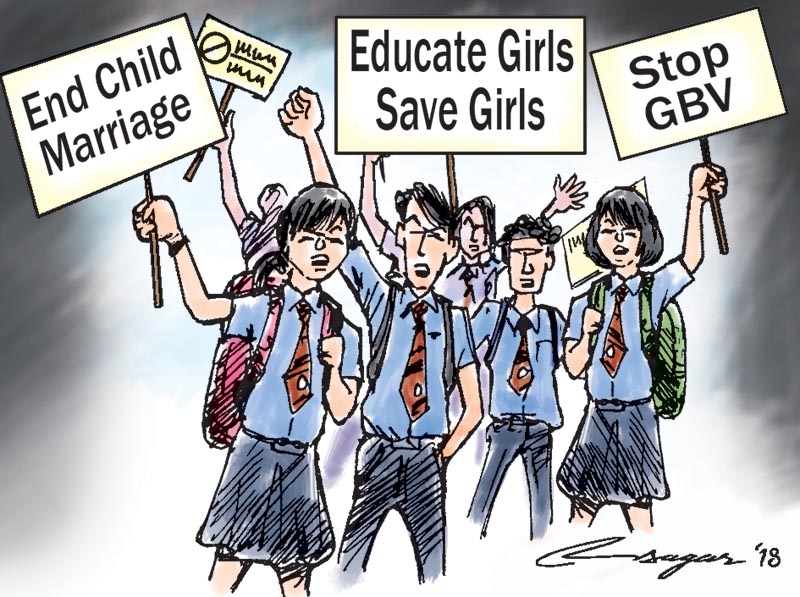Zero tolerance against GBV: Easy to commit, difficult to deliver
Now that the Province 2 leaders have openly committed themselves to ending GBV and reserving 50 per cent seats in various job opportunities for women, a strategy is required to help the already active youth to hold the lawmakers accountable for their words and deeds
“Salita wants to be a policewoman. We have made a reservation to enroll 50 per cent women in the police force of Province 2, so this is now a possibility,” committed Mohammed Lal Babu Raut, Chief Minister of Province 2, during the Second Girl Summit held in his province on August 16-17, 2018. His Minister of Law and Justice echoed his commitment. The commitment was made in front of hundreds of youth from Province 2 and Province 1.
The Country Representatives of DFID and UNICEF—the two key partners of Nepal Government who have committed their support in eradicating child marriage by 2030—together with NGO and INGO activists were also present to witness the commitment.
One of the highlights during this summit was the “Beti Padhau Beti Bachau” (Educate Girls Save Girls) campaign that was launched by Chief Minister Raut after an investigative report on 200,000 girls being out of school in Province 2 was published.
During the same event, Salita Sada brought the audience to a standing ovation by talking passionately about the difficulties that children from the Musahar community that she represents face every day; and she also requested the lawmakers who were standing with her to work towards the implementation of their commitments.
She pointed to the security force in duty and expressed her wish to serve her community and her country in front of the chief minister and minister for law and justice.
The gender issues are often associated as responsibilities to be taken up by women only. Over the past decade or two, development works in Nepal were implemented by user groups or different forms of Community Based Organisations (CBOs). As has been the experience all over the world, when activities are taken to the communities, women seem to deliver more efficiently and effectively as compared to men: be it microfinance activities that pump external finance into deprived families via women or taking up advocacy against Gender Based Violence (GBV). However until and unless the whole nation understands and takes up the responsibility of ending GBV, this it will not be effective.
In the new federal set-up in Nepal there are women representatives in different wards and rural and urban municipalities. However, both in the central and provincial governments, majority of ministers are men. Therefore it is very important to have men take up campaigns to end different forms of GBV. But it is equally important to make them accountable to deliver when they commit to ending child marriages and increasing women’s employment to 50 per cent in the police force and other sectors.
While interacting with policy makers and the youth in Province 2, it was very interesting to see both men and boys voicing their commitments to end GBV. They seemed to be aware of the fact that girls and women were oppressed in the Tarai belt and that they had to be educated and saved. But while interviewing them, I found out that most of them, both girls and boys, had were married long before they turned 20, the legal age of marriage in Nepal.
A politician who wanted to keep her identity hidden told me that she was married off at the age of 11 to a 12-year-old boy and was happy that things were changing now. But she was certain that in the Tarai, girls were still being married off when they were 16-17 years old. Keeping them unmarried till the age of 20 was still not possible for the majority of the teens. But in her opinion that was a progress.
Saroj K Patel of Rastriya Janata Party and Chair of Ward 10 said that the biggest challenge in the Tarai was stopping child marriage and educating girls first. He said that when politicians like him learn about marriages of children as old as 17 or 18, they go to intervene but receive threats from the communities. He also said that earlier the legal marriage age was 18 for girls, but now as it is 20, it was creating more problems for girls below 20 who were getting married.
Their marriages were not being registered, and this has deprived girls of several rights. Patel was another lawmaker who pledged his support in ending child marriages and educating girls at the summit.
It is an undisputed fact that Nepal Government is always eager to sign and rectify almost all international treaties related to establishing human rights in the country, including treaties related to child marriage, ending of GBV and discrimination among others. Similarly, the government has also taken a zero tolerance policy towards GBV. However the challenge is when the time comes to implement these treaties and laws, there always seems to be hindrances, resulting in a state of impunity for those breaking the law.
Now that the Province 2 leaders have openly committed themselves to ending GBV and reserving 50 per cent seats in various job opportunities for women, a strategy is required to help the already active youth to hold the lawmakers accountable for their words and deeds. Therefore, the role of the civil society and the donor community who have pledged to support Nepal Government in eradicating child marriage by 2030 is even more crucial now.
Sharma is chairperson of Centre for Investigative Journalism, Nepal






